Tathaastu Foundation’s workshop with Dr. Satinder Maken inspired faculties to balance family, relationships, and self — reminding educators that caring for roots ensures every branch thrives.
Tathaastu Times Desk, Greater Noida-20 September 2025
Tathaastu Foundation, committed to nurturing mental well-being and emotional resilience in academic spaces, organized a Faculty Development Program at Metro College of Health Science & Research, Greater Noida, on the theme “Mental Health Awareness: Flourishing and Healing.” The event was graced by the presence of senior academic leaders including Dr. Kanak Lata, Director Education, Dr. Praveen Kumar Gaur, Campus Director & Principal, Dr. Krishan Kumar Verma, Vice Principal, and Dr. Vivek Chauhan, Professor & HOD, Department of Pharmaceutics. The keynote speaker for the program was Dr. Satinder Maken, who brought her deep insights into the complex intersections of mental health, family, relationships, and professional life.

The program began with the ceremonial lighting of the lamp, symbolizing collective wisdom and enlightenment, followed by a warm welcome extended to the keynote speaker. In a gesture of respect and symbolism, Dr. Kanak Lata and Dr. Praveen Kumar Gaur presented a plant to Dr. Maken, reinforcing the idea of growth, sustainability, and care which stood in harmony with the theme of the day.
In her keynote address, Dr. Satinder Maken unfolded the thought-provoking theme “Caring for everything, but forgetting ourselves,” reminding the faculty that while they carry multiple responsibilities in both professional and personal domains, they often neglect their own well-being. Drawing upon Arlie Hochschild’s seminal work The Managed Heart, she explained the concept of emotional labour, highlighting how individuals constantly regulate their emotions, smiling and supporting others while silently suppressing their own struggles. She emphasized that such invisible emotional work, although rarely acknowledged, contributes significantly to fatigue, burnout, and a sense of invisibility.
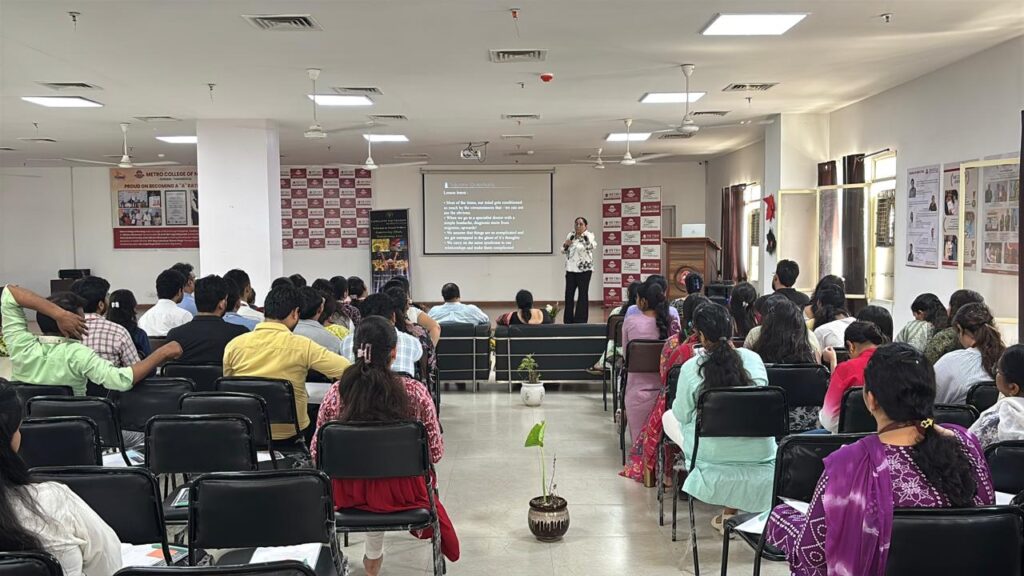
The discussion moved into the realm of communication gaps within families, where stress, lack of time, and digital distractions weaken emotional bonds, leaving unspoken feelings unheard. Dr. Maken reflected on the challenges of parenting in a digital age, where parents oscillate between strictness and guilt, often questioning whether they are guiding their children effectively or simply losing control. She noted that modern parenting must move away from the old paradigm of “Do as I say” towards a more collaborative “Let us explore together.”
Another dimension that resonated deeply with the participants was the dual responsibility borne by women faculty, who manage the demanding expectations of academia while shouldering the second shift of domestic and caregiving duties at home. This double burden often leads to exhaustion, guilt, and loss of identity. She also spoke about the paradox of feeling lonely despite being surrounded by people, pointing out that teachers, although always in the company of students, often feel emotionally isolated. Rediscovering personal identity beyond professional and family roles, she stressed, is an essential step towards healing. She encouraged faculty to reclaim their individuality by reconnecting with hobbies, passions, and values that exist beyond the roles of teacher, parent, spouse, or caregiver.
In debunking common myths around self-care, Dr. Maken reminded participants that self-care is not merely about spa days or indulgent escapes. Instead, true self-care is daily emotional hygiene, which may take the form of journaling, pausing mindfully during the day, learning to say no, setting boundaries, or building authentic support networks. She concluded this section with a powerful reminder: “Sustainable self-care is not indulgence, it is discipline.”
The session was made more engaging through an interactive reflection, where faculty were invited to write down one role that burdened them the most and one small act they could do for themselves in the coming week. This exercise created a moment of self-awareness and connection among the participants. One faculty member shared that she realized she never counts herself as a priority and resolved to dedicate at least ten minutes of mindful breathing to her own well-being. Another remarked that the analogy of watering the roots instead of the leaves gave her a new perspective on focusing on her core well-being rather than trying to control every symptom of stress.
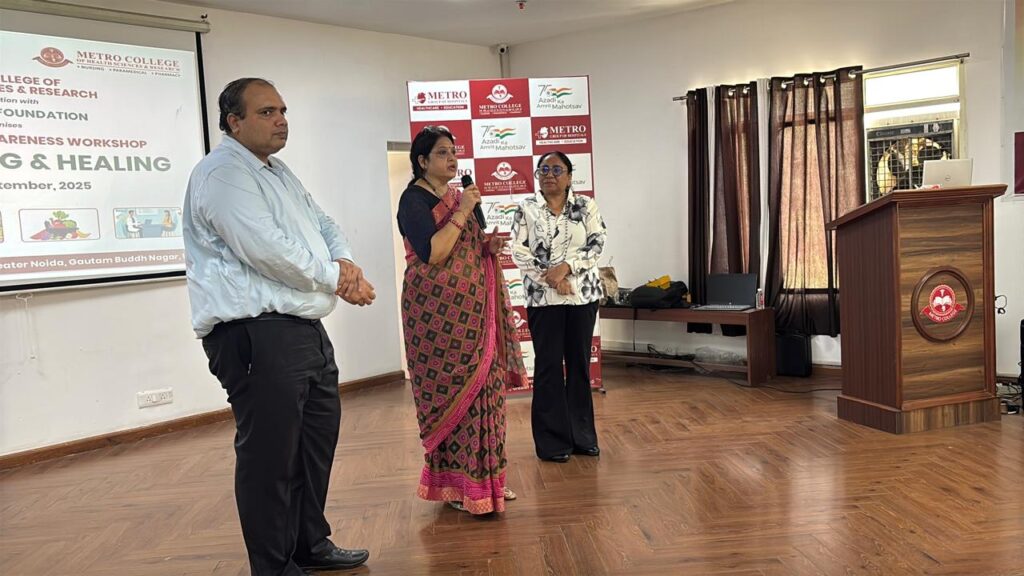
Adding to the enriching session, Dr. Kanak Lata, Director Education, shared her wisdom with the faculty, drawing from her own rich professional and personal experiences. She emphasized that teaching is not only about delivering knowledge but also about sustaining one’s own emotional and mental strength. In her words, “An educator who learns to care for the self creates a ripple effect of positivity in classrooms and in families.” She encouraged faculty members to view self-care not as selfishness but as an investment in becoming better guides, mentors, and role models for students.
Feedback from the faculty reflected the deep impact of the session. Several participants noted that the workshop not only acknowledged their silent struggles but also provided practical strategies for creating balance and healing. One participant observed, “We often forget that behind the teacher is also a human being. Today, I felt seen and heard.” Another faculty member emphasized the relevance of the discussion on digital parenting, adding, “It addressed the guilt many of us carry silently.” A common sentiment that emerged was the power of the thought, “A problem well diagnosed is a problem half solved,” which offered a fresh approach to dealing with personal and professional challenges.

The program concluded with words of gratitude from Dr. Kanak Lata, Director Education, who thanked Dr. Satinder Maken for her inspiring session and acknowledged Tathaastu Foundation for its efforts in creating safe and meaningful spaces for dialogue on mental well-being. She highlighted that such initiatives are not merely awareness drives but are crucial steps in building compassionate, resilient, and flourishing academic communities.
The Faculty Development Program at Metro College was more than an academic exercise; it was a mirror that reflected unspoken truths, a reminder that self-care is indispensable, and a gentle push towards reclaiming balance. As one participant summed it up beautifully, “We nurture students, families, and institutions every day. It is time we learn to nurture ourselves too.”
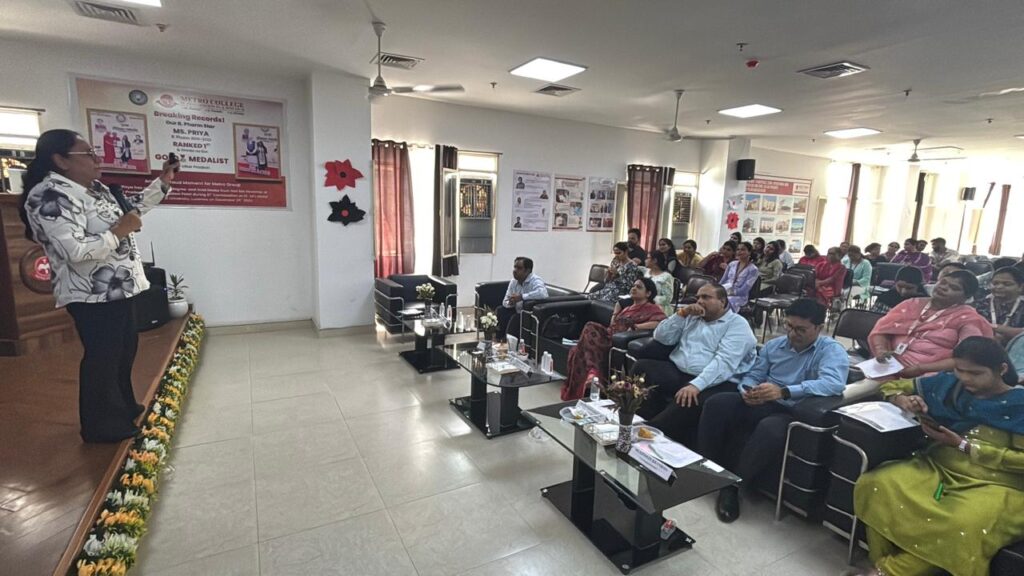
The program concluded on a warm and memorable note as the college dignitaries came forward to present a thoughtful gift to Dr. Satinder Maken. This gesture, offered as a token of remembrance and gratitude, symbolized not only appreciation for her valuable insights but also the lasting bond between the institution and Tathaastu Foundation in their shared commitment to mental well-being.
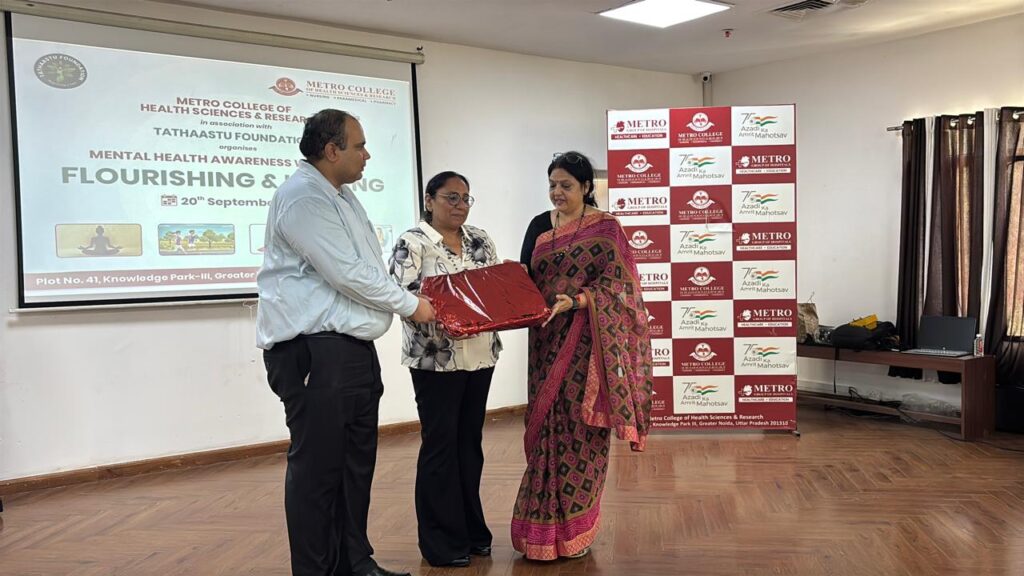

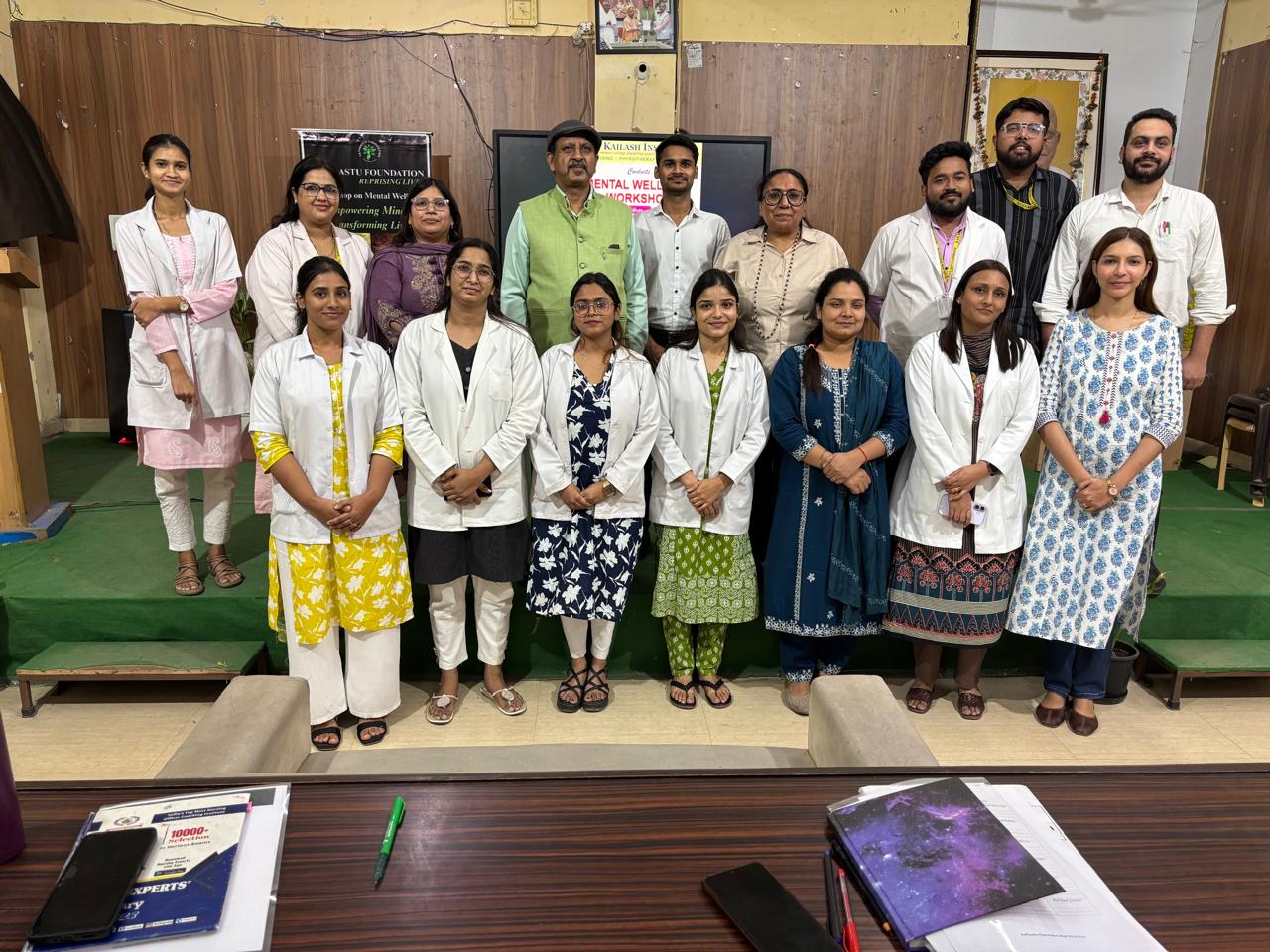
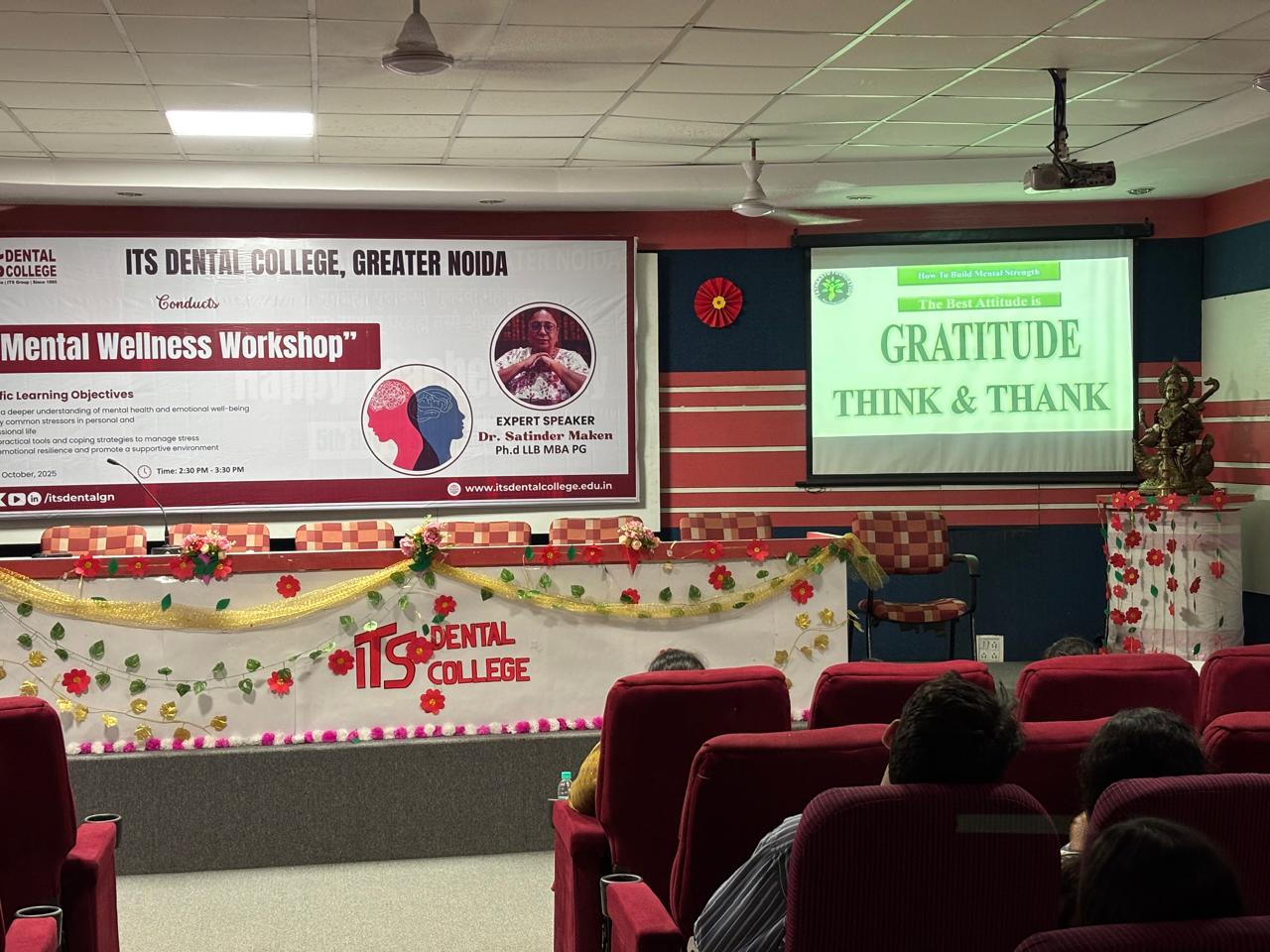
👏🏻👏🏻 What a great session it was.